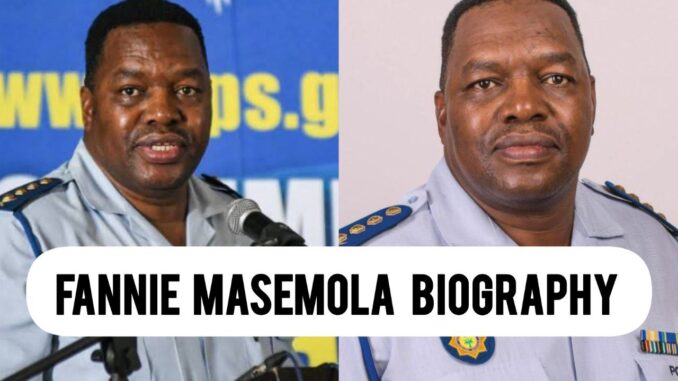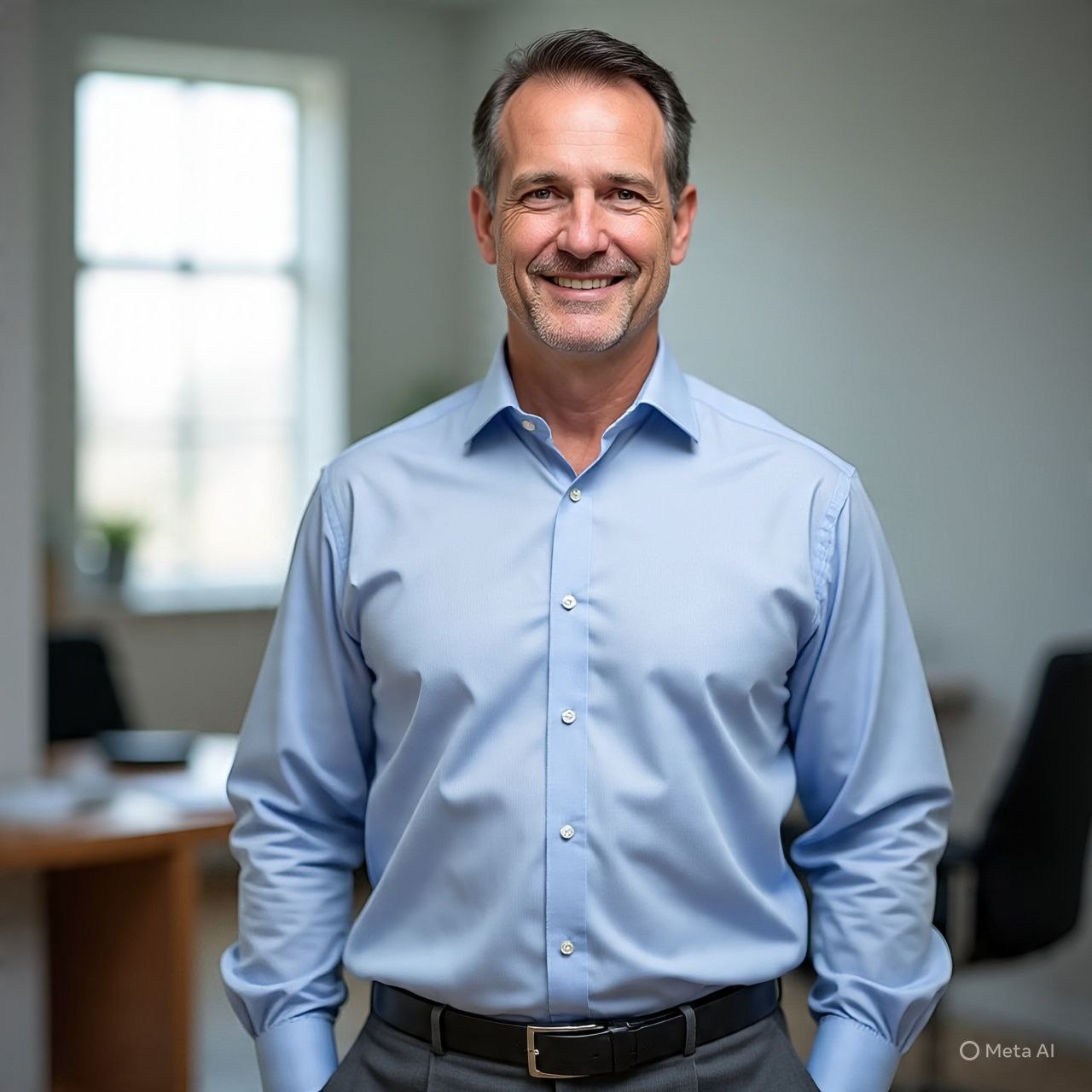
Fannie Masemola Biography
Sehlahle Fannie Masemola was born on April 13, 1963, in Limpopo, South Africa. He grew up in a family deeply rooted in law enforcement—his father and uncles all served as police officers. After finishing high school, he enrolled in a National Higher Diploma in Policing program, where he studied criminal justice, ethics, and community relations. Fannie Masemola is 62 years old as of 2025.
In 1987, at age 24, he formally joined the South African Police Service (SAPS). Over the years, he expanded his expertise with training courses sponsored by the United Nations, leadership programs for senior officers, and human rights seminars that shaped his approach to community‑focused policing. By blending his academic credentials with real‑world experience, Fannie Masemola built a reputation as an officer who valued both rule of law and human dignity.
Fannie Masemola Career
Masemola’s rise through the SAPS ranks was steady and marked by key achievements at each level. In 1994, during South Africa’s first democratic elections, he played a vital role in de‑escalating political violence. Working alongside community leaders, he negotiated safe corridors for voters and coordinated patrols that prevented clashes between rival groups. His success in that tense period earned praise from both political figures and ordinary citizens.
Between 2006 and 2010, Masemola served as Deputy Provincial Commissioner in KwaZulu‑Natal. In that post, he managed operations across a region struggling with high crime rates and occasional unrest. He introduced data‑driven patrol strategies and partnered with local NGOs to address gang violence. His methods reduced violent crime in key hot spots by nearly 15 percent over four years, according to internal SAPS reports.
In 2013, he returned to his home province as Provincial Commissioner of Limpopo. There, he focused on rural safety, launching mobile policing units that brought officers into remote villages. He also established crime prevention forums where residents could meet police leadership face‑to‑face. His open‑door policy strengthened community trust and increased crime tip‑offs by 25 percent over his three‑year tenure.
From 2016 onwards, Masemola advanced to Deputy National Commissioner overseeing policing operations across the country. He coordinated large‑scale initiatives against organized crime, cash‑in‑transit heists, and illicit firearms trafficking. His leadership style combined firm direction with empowerment of regional commanders.
On March 31, 2022, President Cyril Ramaphosa appointed Masemola as National Police Commissioner, succeeding General Khehla Sitole. A presidential selection panel and SAPS leadership backed the decision, citing Masemola’s integrity, operational expertise, and commitment to reform. As Commissioner, he set clear priorities: rebuilding public trust, tackling high‑value thefts, reducing forensic backlogs, and strengthening crime intelligence.
Under his watch, SAPS launched several high‑profile operations. In April 2025, he oversaw the investigation into three missing constables in Tshwane, ensuring transparency when fatalities were confirmed due to reckless driving. He also directed nationwide drug busts that seized millions of rand in illegal substances and led crackdowns on extortion syndicates targeting small‑business owners. Each success bolstered his image as a leader who combined strategic vision with hands‑on engagement.
Fannie Masemola Personal life
Fannie Masemola is married and has children, though he shields their identities for safety and normalcy. Friends describe him as humble and approachable—a rarity for someone in his position. Outside police duties, he enjoys camping in the Waterberg mountains, hiking nature trails, and early‑morning gym sessions that sharpen his mind as well as his body. He also volunteers at youth leadership workshops, teaching at-risk teens about career paths in community service. This personal commitment to grounding himself in everyday South African life reflects his lifelong belief that effective policing depends on officers understanding the people they protect.
Fannie Masemola Controversies
No high‑profile career is without dispute, and Masemola’s tenure has faced several challenges. Soon after his 2022 appointment, questions arose about his security clearance. Critics alleged that his Top Secret clearance had lapsed in 2018 and was not renewed before he became Commissioner. Political activist Mary de Haas called the appointment “irregular,” warning of potential intelligence risks. In response, Police Minister Bheki Cele affirmed that the president’s constitutional authority to appoint the Commissioner was sound and confirmed that re‑vetting efforts were underway following Masemola’s application to the State Security Agency.
Debate also surrounded the opaque selection process. The Democratic Alliance and AfriForum criticized the presidential panel for lack of transparency, suggesting undue influence inside the SAPS. They demanded clearer criteria and public reporting on the interview and vetting stages. Supporters, however, argued that confidentiality was necessary to protect sensitive security considerations.
Another point of contention involved resource management. Reports claimed Masemola authorized procurement of numerous high‑end vehicles—BMWs, Audis, and Jeeps—while heading Crime Intelligence. AfriForum flagged these purchases as lavish, calling for a forensic audit of procurement procedures. Masemola’s office countered that the vehicles met operational needs for undercover and long‑range missions.
Fannie Masemola – Nhlanhla Mkhwanazi Case
Tensions escalated in mid‑2025 when KwaZulu‑Natal Police Commissioner Nhlanhla Mkhwanazi made explosive allegations against multiple senior officials. He accused Police Minister Senzo Mchunu and Deputy National Commissioner Shadrack Sibiya of disbanding the Political Killings Task Team at Mchunu’s behest and of archiving case dockets in Pretoria. Mkhwanazi named a syndicate of underworld figures, politicians, prosecutors, and law‑enforcement officers linked to high‑profile killings.
In a virtual briefing from Vanderbijlpark, Masemola confirmed that he had beefed up Mkhwanazi’s personal security after the provincial commissioner reported death threats. Masemola stressed that he would not persecute Mkhwanazi and awaited presidential guidance on the matter. He also clarified that he did not know the exact reasons behind the task‑team’s closure but noted that he had repealed a R360 million contract awarded to underworld figure Vusimuzi “Cat” Matlala when irregularities surfaced during the bidding process.
Masemola’s approach—balancing firm protection of colleagues with open acknowledgment of disputes—highlighted his commitment to unity within SAPS. Nevertheless, public confidence wavered as each faction called for independent inquiries. Critics pressed for a judicial commission of inquiry to resolve the allegations once and for all. Proponents of Masemola argued that ongoing internal mechanisms and cooperation with the National Prosecuting Authority would suffice to address any corruption or interference.
Conclusion
From a young recruit in Limpopo to the National Police Commissioner, General Fannie Masemola’s career reflects decades of dedication to public safety and community partnership. He has led efforts to de‑escalate political violence, improve rural policing, crack down on major crimes, and enhance forensic capabilities. His measured responses—strengthening protection for threatened officers, approving contract cancellations, and promising formal inquiries—underscored a leadership style rooted in accountability and transparency.
FAQs
What training did Fannie Masemola receive before joining SAPS?
He earned a National Higher Diploma in Policing and completed United Nations policing, leadership, and human rights courses.
How did he handle the missing constables case?
He led a transparent investigation in April 2025, confirming fatalities from reckless driving and dispelling conspiracy theories.
Why was his appointment as Commissioner controversial?
Critics cited a lapsed Top Secret clearance, an opaque selection process, and alleged irregular vehicle procurements.
What disputes involve Nhlanhla Mkhwanazi?
Mkhwanazi accused senior officials of disbanding the Political Killings Task Team; Masemola beefed up Mkhwanazi’s security and awaits further guidance.

Donald George holds both a Bachelor’s and a Master’s degree in Fine Arts and has spent the past decade honing his craft in Astrophotography and Origami. He has authored numerous academic papers on astrophotography techniques and the art of paper folding, and his work is frequently cited in specialist journals. With ten years of hands‑on experience, Donald combines his artistic vision and technical expertise to push the boundaries of both traditional fine art and Astrophotography.
Leave a Reply